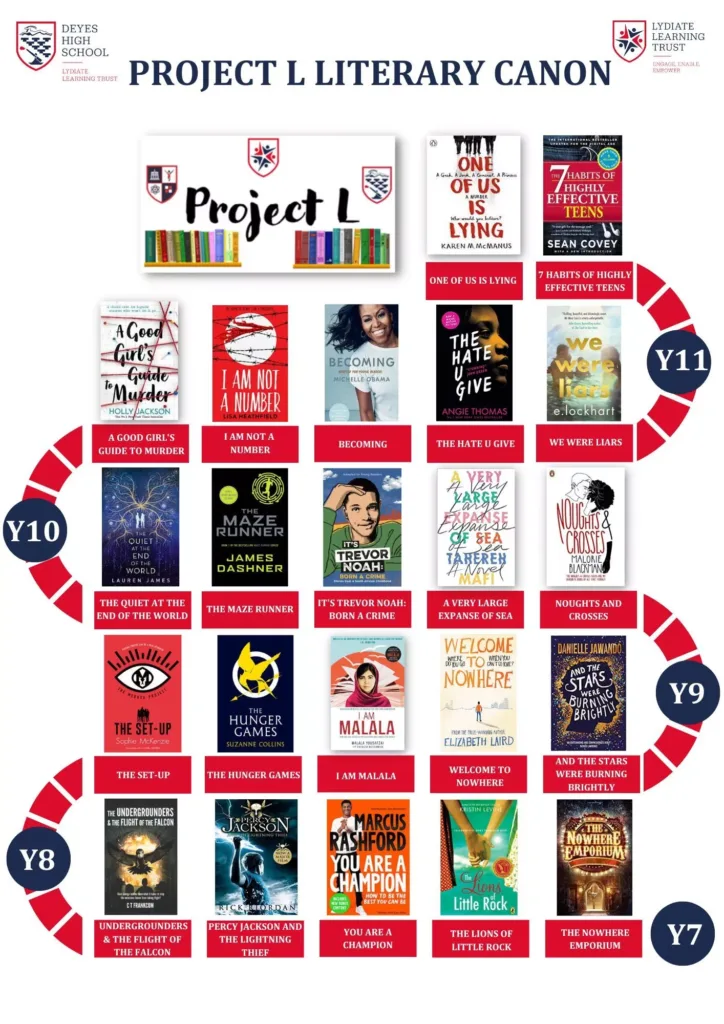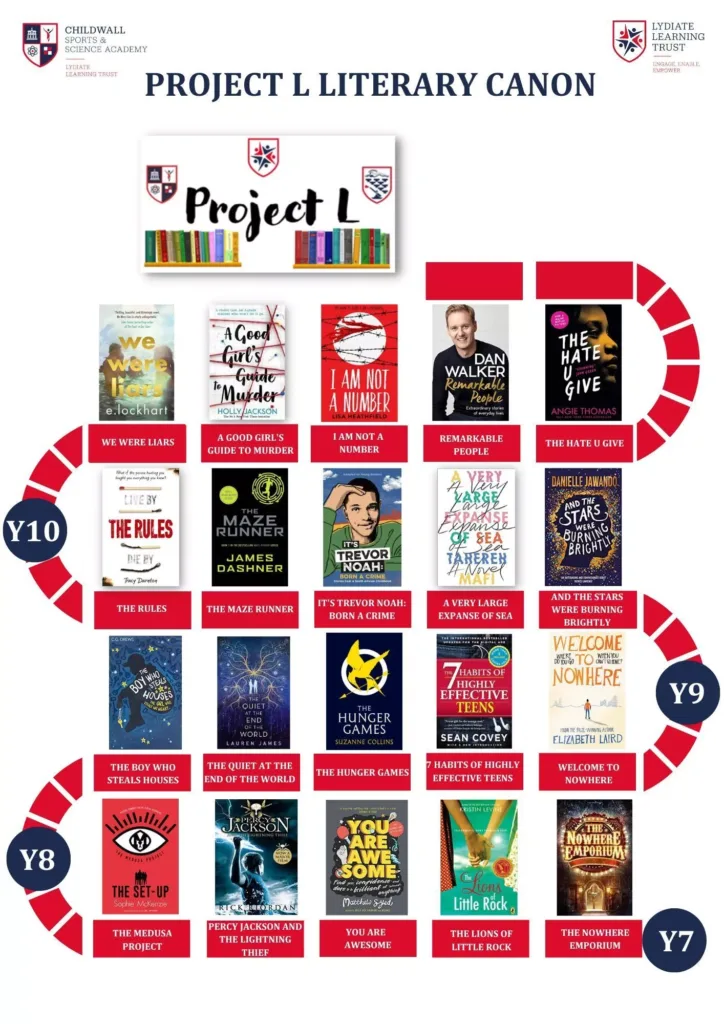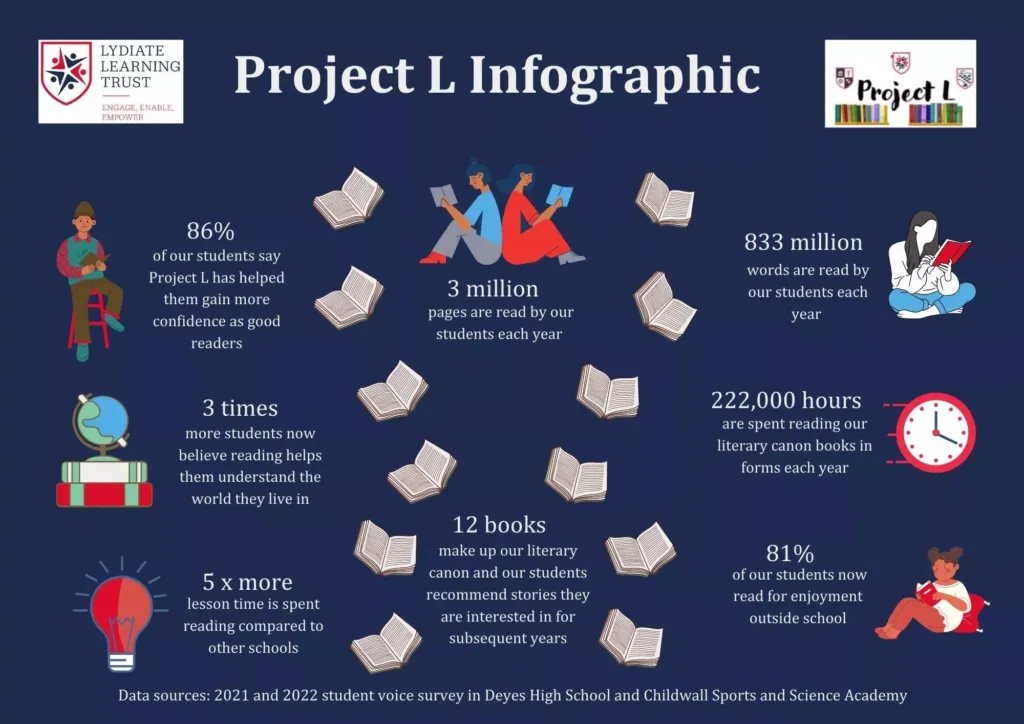Developing a Passion for Literacy
Lydiate Learning Trust launched its innovative ‘Project L’ in partnership across the Trust in September 2020 to rapidly develop students’ literacy skills.
The aim was simple: to motivate students to read for pleasure. Initial student voice indicated that few students read for pleasure, if at all.
To break down this barrier, we created our Lydiate Learning Trust Literacy Canon, choosing engaging and thought-provoking texts, to show students that, whatever their interests, books can inspire!
We utilised the Education Endowment Foundation’s recommendations for improving literacy in secondary schools, discussing the strands that had the most scope and rigour to transform whole school literacy and the teaching of reading.

As a Trust, we took the bold move of incorporating bespoke 30-minute daily reading lessons into our curriculum. Students read with their form tutor, and each year group reads the same book at the same time, creating a shared reading experience and sparking opportunities for discussion and enjoyment. Dedicated curriculum time devoted to reading underpins our commitment to deeply embed literacy within our school culture, to ensure that all our students are afforded the best possible life chances and develop a lifelong love of reading.
Reading aloud improves information processing skills, vocabulary, and comprehension. Reading for pleasure is the single biggest indicator of a child’s future success and social equality – more than their family circumstances, parents’ educational background or income.
Key outcomes include:
- Improvement in vocabulary in comparison to non-readers (Millennium Cohort Study)
- Correlation between regularity of reading for pleasure and ability in reading each reinforcing the other as students get older (Cremin 2019, Torppa 2020)
- Better performance in subjects other than English (Millennium Cohort Study)
- Reading for pleasure is one of the most important predictors of test scores at age 16, regardless of background (OECD)
- There is a strong correlation between regular reading for Pleasure and Mental Wellbeing which is separate from other predictors (NLT 2018)
- Reading improves a child’s empathy skills (Oatly 2016)
- Interventions developing Reading for Pleasure attitudes have a greater influence on reading ability than reading lessons for older children/adults (Greenberg 2014)
- The Department for Education’s Reading Framework – Teaching the Foundations of Literacy published in July 2021 includes evidence on Reading for Pleasure and how it might be put in practice in the curriculum.
Our Literary Canon genres include both British and American fiction, non-fiction, autobiographies, fantasy action, adventure, and diversity. Many books are part of a wider collection such as The Medusa Project, Percy Jackson & the Lightening Thief and The Hunger Games to encourage students to continue reading series outside school.


Crucial to the success of Project L is investment in training staff in reading strategies, how to support staff with targeted vocabulary instruction to ensure that disciplinary literacy was prioritised across all subject curriculums to ensure that students had the full tier two and three vocabulary to make their language richer. All staff are trained in reading strategies for weak and free readers, phonics, and phonological awareness.
By reading more, students understand the discipline-specific aspects of writing that relate to the subjects that they study and how writers use form and language to create coherent themes within a text. Some of the effective ways we have combined reading and writing include writing before reading; using annotations; writing short summaries; creating checklists; anticipating common misconceptions and highlighting how writers avoid them.
Project L has heightened students’ awareness of spelling, punctuation, and grammar in written work. Reading helps students understand familiar word patterns, common spelling errors and the role of modal verbs when attributing fine grained judgements in their written work.
Project L is now fully embedded across our Trust and many students tell us that reading is their favourite lesson. Across the Trust, and in individual schools, we have created literacy groups who follow Lexonik Leap and Advance Programmes so all our students can access every aspect of reading.
Following a May 2022 inspection visit to Childwall Academy in May 2022, Ofsted commented: ‘Leaders, governors, and trustees are passionate about the importance of reading. Leaders ensure that they identify gaps in pupils’ reading knowledge. Specially trained staff provide extra support for pupils to ensure that they catch up quickly. Daily reading lessons develop pupils’ confidence in reading aloud. Teachers carefully select books to engage pupils in reading and to develop their cultural knowledge.’
Click here to watch our Project L launch video.
To read our latest Lydiate Learning Trust publication to find out more about Project L and other Trust innovations, please click here



